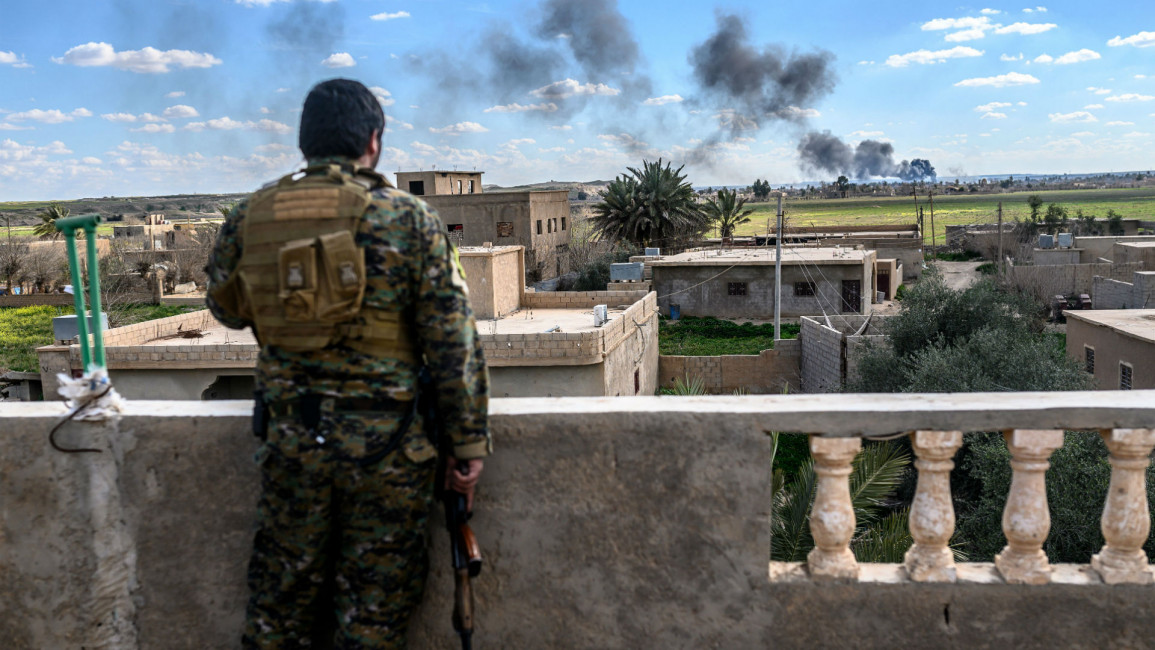
The Islamic State group will be back after Baghouz
The Islamic State group will be back after Baghouz
Comment: Any focus on victory over IS ignores the immense work ahead, writes Bashdar Ismaeel.
4 min read
An SDF fighter watches the battle against the Islamic State group in Baghouz [Getty]
From controlling large swathes of territory across Syria and Iraq, the Islamic State group's final battle to the death in the small dusty town of Baghouz says much about their rapid decline.
However, as anxious as US President Donald Trump was to declare victory, the battle against IS does not stop at Baghouz.
This week, Trump, on his way back from abruptly-ended talks with North Korean leader Kim Jong-un, declared to reporters that "100 percent of the caliphate" had been captured. Trump's statement came just a few months after he declared in December the US had "defeated ISIS in Syria", and in a surprise decision, announced that the US would make a full withdrawal of troops from the country.
The hasty announcement led to a number of high profile resignations, including that of US Secretary of Defense James Mattis, and a general unease among local and Western allies.
Even as Trump waved the latest victory flag over IS, hundreds of civilians continued to pour out of Baghouz, with scores of IS militants holed up in the last pocket of territory, ready to fight to the death.
Twitter Post
|
Kurdish-led Syrian Democratic Forces (SDF) spokesman Adnan Afrin contradicted Trump's victory statement stressing they were waiting for the evacuation operation to finish before launching a final "assault or surrender" operation.
Ultimately, Baghouz will be captured, but a military victory does not spell the end of IS or indeed the immense work that remains as a result of years of devastating IS rule.
As recent deadly attacks in Iraq and SDF-controlled territory has shown, the extensive network of IS sleeper cells and local support means that IS remains a clear danger that Syria, Iraq and the West ignore at their peril.
IS continues to have a presence in vast Syrian Badia desert, and reportedly retains thousands of potential fighters at its disposal. The task is only made greater with the large number of IS fighters blending in with civilians.
Baghouz merely marks the end of one phase of the war against IS. IS now returns to its traditional insurgency roots and is ready to wreak new havoc.
In fact, the battle against an enemy is easier when the enemy is visible or controls key towns and installations. Now, to ensure long-term defeat of IS, the next phase involves counter-insurgency operations and the establishment of a strong intelligence network that needs the US at the heart of operations.
The US remains committed to withdrawing its 2,000 troops by the end of April, but the US has finally caved into pressure from EU allies to keep a residual force of approximately 200 troops. While this force is ostensibly aimed at enforcing security along the Turkish border with other coalition forces, active US engagement is still needed on the ground in counter-terrorist offensives against IS.
The continued might of IS has not been lost on US military officers that have warned that IS could quickly re-establish pockets of control within six months in the absence of "sustained counter-terrorism pressure".
The view of Joseph Votel, the top American general in the Middle East, contrasts directly with the more triumphant tone of Trump.
Votel disagreed with sudden announcements to withdraw troops and underlined that defeat of IS "doesn't mean the end of the organisation" or their "very powerful ideology".
"[IS] still has leaders, still has fighters, it still has facilitators, it still has resources, so our continued military pressure is necessary to continue to go after that network," he said. Local forces were not ready to handle the threat of IS alone, he said.
Twitter Post
|
Votel's statements were echoed by Director of National Intelligence Dan Coats, who warned "ISIS is intent on resurging and still commands thousands of fighters in Iraq and Syria".
Moreover, while IS may have gripped the spotlight, it should not detract from dozens of other insurgent groups in Syria, especially in Idlib, who also pose major threats to security.
In addition to ongoing security operations, overall political stability is vital for the real long-term defeat of such groups. After all, it was the chaos of the Syrian civil war that gave the platform for the rapid ascendancy of IS in the first place.
Questions also remain over the long-term fate of Syrian Kurds who have been vital US allies but who Turkey accuses of being a terrorist group, as well as the greatly expanded territory they now control.
Then there is the thorny topic of thousands of IS captives held by local authorities, many of them originally from EU states, as well as the thousands of IS families in various camps. The mass exodus from Baghouz alone has resulted in the al-Hol refugee camp in northern Syria quickly exceeding 50,000 people.
Any focus on victory over IS ignores the immense work ahead. The region has been devastated by years of IS rule and the bloody fight against the group.
The deadly and unpredictable Syrian war has proven that the ever-changing dynamic continues to spring new surprises and conflict lines just when the local population is given brief respite.
Bashdar Ismaeel is a writer and geopolitical, energy and security analyst.
Follow him on Twitter: @BashdarIsmaeel
Opinions expressed in this article remain those of the author and do not necessarily represent those of The New Arab, its editorial board or staff.




